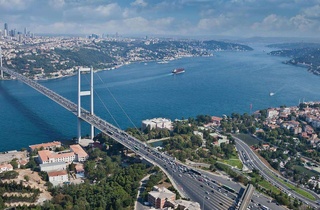103 retired Turkish generals released a joint statement, calling on the government to steer clear from the discussions regarding Turkey’s withdrawal from the Montreux Convention, a 1936 agreement that gives Ankara control over the Bosporus and Dardanelles straits and regulates the transit of naval warships.
The statement claimed that Turkey would be able to face life-threatening risks and dangerous events endangering national security if it withdrew from the convention.
Many politicians from the ruling Justice and Development Party blamed the retired general for implicitly calling for a military coup in the country.
“The Great Turkish nation is in love with the military uniform. It's an honor to carry the uniform. It's a greater honor to carry that honor after retirement. We always thankfully remember those who are faithfully committed to democracy, the state and the nation, who have not made their ranks and uniforms as a political tool,” tweeted Interior Minister Süleyman Soylu.
“On July 15, this nation demonstrated to everybody how it had defeated the coup plotters. Know your place!” said Fahrettin Altun, the presidency’s Director of Communication.
Ak Party’s spokesman Ömer Çelik criticized the retired general for the statement, saying: “It is unacceptable that some retired admirals release a declaration with a method and style that reminds bad and ugly events of the past. It is clear what this method and style correspond to in our political life.”
“On July 15, our heroic nation buried not only the FETO coup plotters but also all the coup lovers we know were fed from the same source. Releasing a coup-evocative statement is not an explanation of thought,” said Mustafa Şentop, the Speaker of the Grand National Assembly.
The Montreux Convention Regarding the Regime of the Straits is a 1936 agreement that gives Turkey control over the Bosporus and Dardanelles straits and regulates the transit of naval warships. The Convention guarantees the free passage of civilian vessels in peacetime and restricts the passage of naval ships not belonging to Black Sea states. The terms of the Convention have been a source of controversy over the years, most notably about the Soviet Union's military access to the Mediterranean Sea.
Signed on 20 July 1936 at the Montreux Palace in Switzerland, the Convention permitted Turkey to remilitarise the Straits. It went into effect on 9 November 1936 and was registered in the League of Nations Treaty Series on 11 December 1936. It remains in force.
However, Turkey’s Kanal Istanbul project, currently under construction, may be a possible bypass to the Montreux Convention and allow greater Turkish autonomy with respect to the passage of military ships (which are limited in number, tonnage, and weaponry) from the Black Sea to the Sea of Marmara.
The Kanal project (or “Istanbul canal”), involves the building of a 45-kilometer-long artificial waterway through Thrace, connecting the Sea of Marmara with the Black Sea. While this route will run nearly parallel, but not via the Bosporus, ships transiting through it are arguably not subject to the terms of the Montreux Convention. Currently shipping traffic through the Dardanelles is heavily congested with long wait times to pass through the Bosporus. The Kanal project‘s primary purpose is to clear up shipping traffic and boost revenue by providing an alternate maritime route.
However, the Kanal’s potential ability to end nearly a century of limitations imposed by the Montreux regime was never overlooked by both commentators and politicians, and in January 2018, then Turkish Prime Minister and former Transport Minister, Binali Yıldırım announced that the Kanal would in fact not be subject to the Montreux Convention. This announcement was received negatively by Russian media and government and many have disputed the Turkish government‘s interpretation of the convention‘s original terms. (ILKHA)



 Dünya
Dünya
 Dünya
Dünya
 Dünya
Dünya
 Dünya
Dünya
 Güncel
Güncel
 Güncel
Güncel
 Dünya
Dünya
 Dünya
Dünya
 Güncel
Güncel
 Güncel
Güncel





